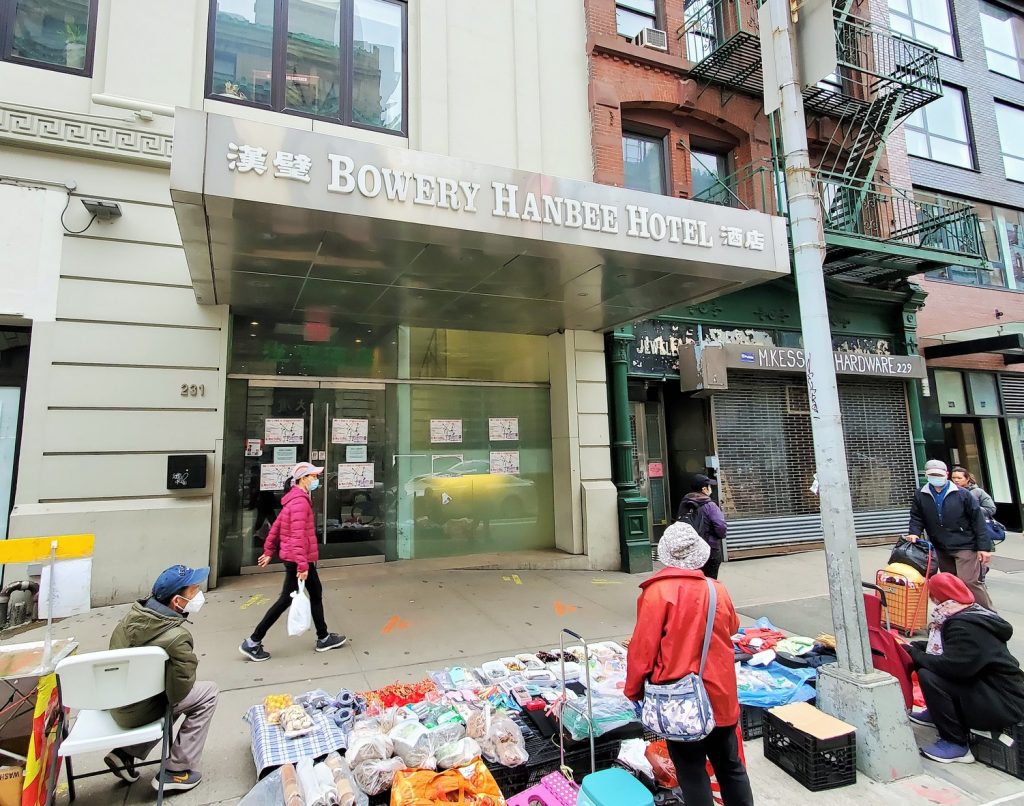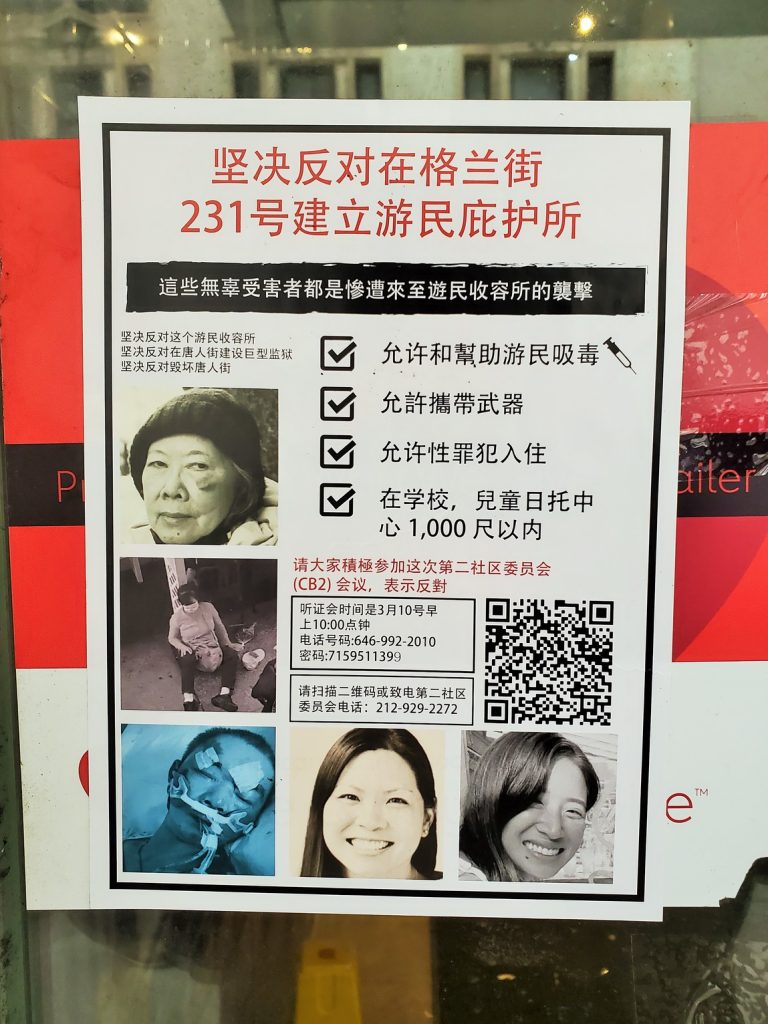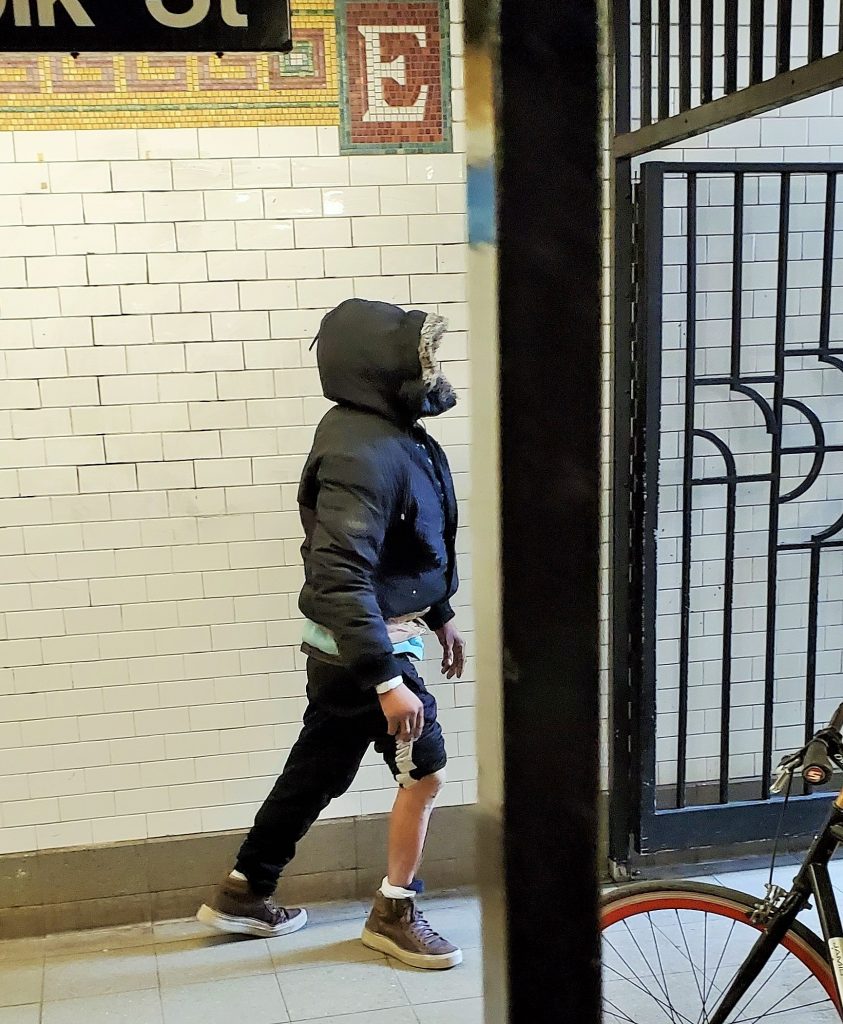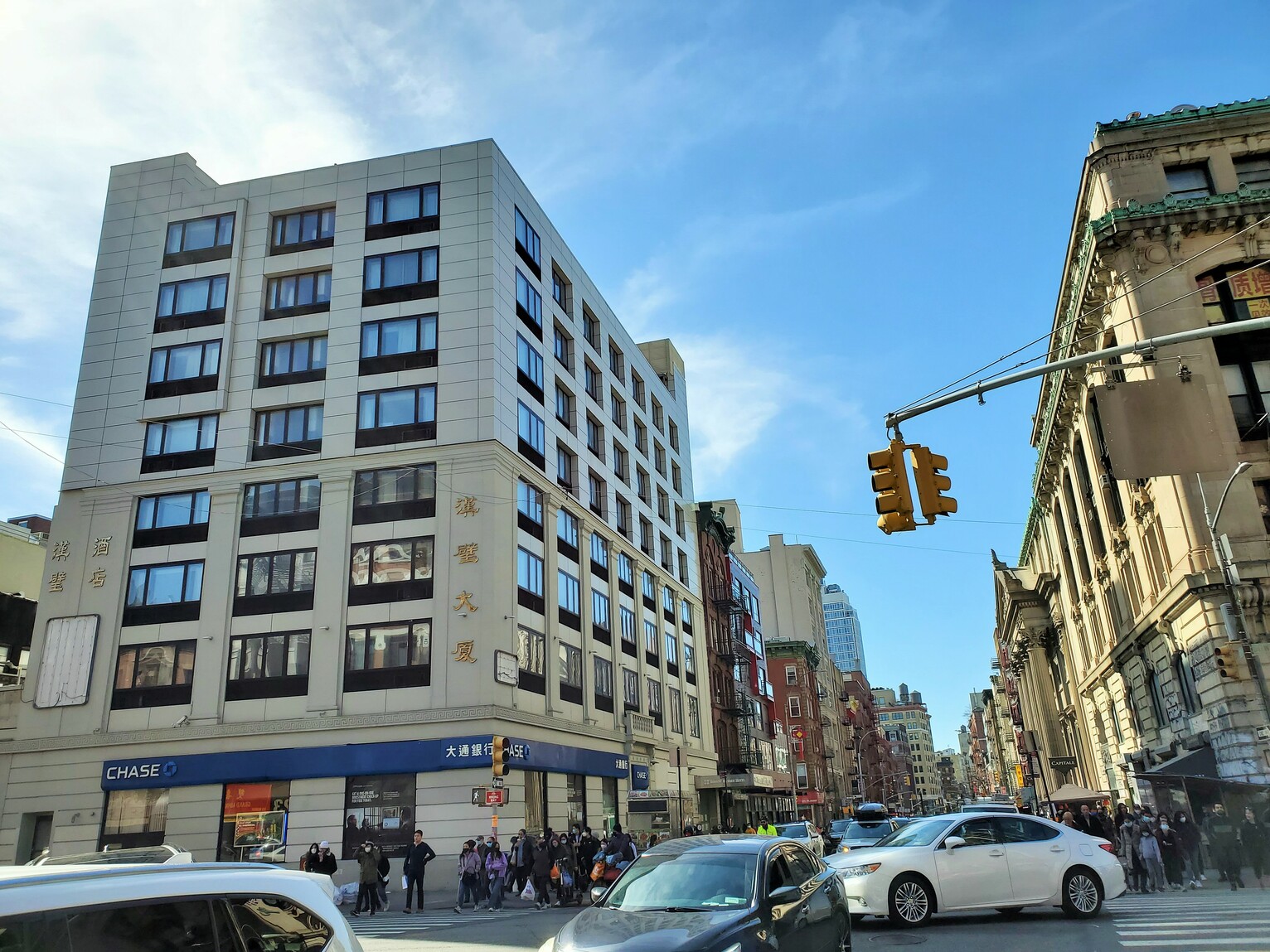BY LINCOLN ANDERSON | Updated May 2, 9:00 p.m.: In a stunning reversal and a major victory for Chinatown residents and merchants, Mayor Adams has called off plans for a Safe Haven-type homeless facility at 231 Grand St.
But the shelter’s sinking actually wasn’t because of community opposition — but due to opposition from the Hotel Trades Council, at least according to Charles King, the executive director of Housing Works, the organization that would have run the place.
Housing Works had planned to operate a 24/7 harm-reduction-style, homeless drop-in center, as well as more than 90 stabilization beds for homeless people at the former eight-story hotel building at the corner of Bowery and Grand Streets.
“Yes, [it was canceled] by the mayor — to be specific, at the urging of the Hotel Trades Council,” King asserted to The Village Sun. “What we gathered is that the Trades Council is going to oppose any hotel conversions where they believe the building should be brought back as a commercial hotel and employ their staff.”
During the pandemic, the city has used hotels on a temporary basis as a safer housing alternative than its congregate homeless shelters. In the latter, multiple people typically live and sleep together in the same room or space. The city’s use of these commercial “COVID hotels” is now winding down.
On the other hand, the planned Housing Works shelter in Chinatown was going to be permanent; Housing Works even hoped to purchase the building, taking it offline forever as a commercial hotel.
King said the local Chinese press incorrectly reported that the project was canned due to opposition by Chinatown.
“Had nothing to do with it,” he shrugged.
As he recounted it, the end of the contentious plan spiraled down swiftly, starting this past weekend.
“What we were told on Saturday evening was we had to fix the problem with the union,” he related. “We were told that the mayor was not moved by the community concern, but that we had to come to terms with the union. We were told that if we didn’t have an agreement with the union by the end of today, the project would be canceled.”
King said the back-and-forth with the mayor went as follows. On Saturday, “a friend of Housing Works,” as he put it, called the mayor directly. On Sunday, the mayor texted that individual a message. On Monday morning, a representative of the hotel’s owner got a phone call from a representative of the mayor.
King said, in their last-minute negotiations to try to salvage the plan, they tried to see if at least the custodial workers of the Hotel Trades Council could be employed at the planned Housing Works facility. But a deal couldn’t be worked out since Housing Works, though a union shop, is represented by a different union, the Retail, Wholesale and Department Store Union (RWDSU).
“So we could not recognize them,” he said, adding that the Hotel Trades Council turned that plan down anyway. “They weren’t open to any proposition.”
Asked what the next step is for Housing Works, at this point, in terms of securing a new building for a homeless facility, a frustrated King said, “We’re done. What are we gonna do? I think the bottom line is all the mayor’s talk about dealing with homelessness is bulls—. You can quote me on that.
“If he’s going to allow the hotel workers union to veto projects… . This took me a year,” King said, in exasperation. “You think I’m going to go through this — the Fair Share process, dealing with the O.M.B. [budget process] — and then have them come in and say, ‘We don’t support this’ at the last moment?”
The city’s Office of Management and Budget had approved the project, though the O.K.’ing of the contract was pending, King said. Assuming the contract got signed, the building was slated to open on May 23.
The Housing Works honcho sounded completely soured on dealing with the city.
“At least we’re not [going to be] doing any business with the Department of Homeless Services,” he said. “It’s clear that the mayor is not serious. … I don’t think he has any serious commitment to [addressing] homelessness.”
The Village Sun has reached out to the Mayor’s Press Office for comment.
After this article’s publication, Ben Carlos Thypin, the founder of Open New York, the prominent, pro-development YIMBY group, retweeted it, flagging with two fire emojis King’s comment slamming the mayor on addressing homelessness.
“I think the bottom line is all @NYCMayor’s talk and dealing with homelessness is bulls—. You can quote me on that.” 🔥 🔥 https://t.co/uXDexc41jo
— Ben Carlos Thypin (@SoBendito) May 3, 2022
Meanwhile, Susan Lee, the leader of the Alliance for Community Preservation and Betterment, said the news was confirmed by Patrick Kwan from the Mayor’s Office of Community Affairs. According to Lee, what she was told was that it was the pushback from Chinatown — not the hotel workers union — that made the difference.
In addition, according to a source, the city’s Department of Social Services issued the following statement earlier today:
“After reviewing planned shelter sites scheduled to open in Chinatown, we have decided to reevaluate [and relocate] this shelter capacity to an area with fewer services and shelter for those experiencing unsheltered homelessness. Our goal is always to work with communities to understand their needs and equitably distribute shelters across all five boroughs to serve our most vulnerable New Yorkers.”

In related news, last Friday The New York Times reported that another shelter planned in the Chinatown area, at 47 Madison St., had been shelved for the same reasons as stated above. That site is in Community Board 3, whereas the Grand Street location is in C.B. 2.
Regardless of how we won this battle, I am sure we moved the needle a bit. If we don’t give ourselves credit, then no one will. Charles King will not give us credit because he’s trying to discourage community engagement. It’s bad for business for him. It’s a business to him!
— Susan Lee (@susanleenyc) May 3, 2022
Lee, a Tribeca resident and former City Council candidate in District 1, has been a point person in the Chinatown community’s battle against the Housing Works plan. She issued the following statement:
“We applaud Mayor Adams for listening to the concerns of the Chinatown community.
“While the cancellation of the proposed shelter at 231 Grand St. is a move in the right direction, the Alliance for Community Preservation and Betterment remains committed to working with the mayor to address other concerns in the community.
“The former Hanbee Best Western Hotel at 231 Grand St. had over 900 4-star reviews before the pandemic — it brought tourist dollars to the city. With tourism returning to New York City, it is vitally important to keep this hotel open to serve our tourism needs.
“Chinatown never fully recovered from 9/11 and the residual post-9/11 policies, unlike most other communities. When COVID-19 hit in early 2020, Chinatown suffered not only from the lockdown and other protocols but from an explosive rise in hate crimes.
“Our community continues to endure deteriorating neighborhood conditions, worsening public safety and a decline in business and tourism. Residents, small business owners, visitors and tourists alike want to be a part of the revitalization of this vibrant community. Critical improvements in economic recovery and basic quality of life will make Chinatown a desirable destination once again for all New Yorkers and tourists, and contribute to the city’s prosperity.
“The Alliance wants to thank all its volunteers, members, supporters and, most importantly, its committee members who have logged countless volunteer hours and worked tirelessly since February. Thank you also to Manhattan’s Community Board 2 for their dedication and support in service of our shared community.”
The plan for 231 Grand St. was put into place by Adams’s predecessor, Bill de Blasio.

Over the past two months, hundreds of people representing Chinatown had turned out at C.B. 2 meetings to voice their opposition to the Grand Street shelter, arguing that the area — including Sara D. Roosevelt Park — is already oversaturated with facilities for the homeless. Problem-plagued S.D.R. Park is known as a hotspot for K2, synthetic marijuana, which is known for causing erratic behavior in its users.
In February, Christina Yuna Lee was brutally stabbed to death inside her Chrystie Street apartment a block and a half away from the proposed shelter site by a homeless man who had snuck into her building behind her.
Heeding the community’s outcry, Board 2 recently voted, in an advisory resolution, to oppose the Housing Works plan for 231 Grand St. by a vote of 37 to 6. King said the community board’s review of the plan was part of the city’s Fair Share process, which determines that city facilities are evenly spread throughout the city. Outraged opponnets had railed that the area already has six homeless shelters, with four more planned, including the Grand Street site.
However, Susanna Aaron, the chairperson of the board’s Human Services Committee, had strongly lobbied for C.B. 2 not to issue a resolution on the issue — and, if there were to be a resolution, at least for it not to oppose the shelter. She, like Housing Works C.E.O. King, argued that the shelter would not worsen but would instead reduce quality-of-life problems in the surrounding neighborhood by moving them indoors into the Grand Street building, where people could receive “wraparound services.”

Under the harm-reduction model, people would have been allowed to bring drugs into the facility and freely shoot up. The idea behind the Safe Haven-style shelters is to have a “low threshold” for entry in order to draw in street homeless people resistant to coming indoors.
Aaron also pointed out that two of the six existing homeless sites are not permanent and are scheduled to shut down relatively soon.
But Chinatown opponents argued that half of the Grand Street site’s users would be drawn from outside the immediate area, including from outreach in Washington Square Park and the Manhattan subway system. And they said a city-contracted non-congregate COVID hotel that was there previously during the pandemic had noticeably worsened the area’s quality of life.
In the end, C.B. 2 members overwhelmingly chose to side with the Chinatown community against the plan.
“I would have preferred that the shelter were halted because a Fair Share analysis determined that the area was, in fact, saturated,” Aaron told The Village Sun on Monday after the latest news broke. “Instead, the Fair Share analysis was not even executed and it seems that this decision was the result of political wrangling by a group that was owed favors from the mayor. I’m disappointed, not by the outcome, but by the process — or the lack thereof. It is not an example of good governance.”
Meanwhile, King added that the canceling of the 231 Grand St. plan means Housing Works will now have to lay off 80 workers. These employees were working at a COVID “quarantine hotel” in Hell’s Kitchen and a COVID “isolation hotel” in Long Island City that the organiztion has been running on a temporary basis but which the city is now winding down. Housing Works had intended to shift those workers to the Chinatown homeless facility.


You are deliberately misrepresenting the Housing Works model for Safe Haven shelters. They are not “scammy” and “cruel.” They do not keep people on the streets. Instead, they’re a client-centered model that attempts to meet people where they are and actively supports them as they move toward a supportive housing solution.
I think it is an abomination that self-described activists are embracing the NIMBY label and opposing solutions like this.
It’s an abomination that nonprofits earn $4000 a month managing each 8-hour-daily crowded, overnight sheltering session for NYC’s homeless individuals instead of building them permanently free, 24hour supportive housing, which literally costs less than scammy, expensive shelters.
It’s that scam which people oppose, not the homeless themselves
This Housing Works guy sounds like a piece of work. Glad this got shot down. I don’t believe a word that the Hotel Trades Council union had any influence on this, because they had no problem with the hundreds of other hotels that have been repurposed into shelters, albeit temporarily. They also happened to get even more paid to work in them.
I get why he’s angry. A grifter like him losing out in a multimillion-dollar contract? I’d be angry too 😂, losing out on my personal fiefdom!
> Meanwhile, King added that the canceling of the 231 Grand St. plan means Housing Works will now have to lay off 80 workers. These employees were working at a COVID “quarantine hotel” in Hell’s Kitchen and a COVID “isolation hotel” in Long Island City that the organiztion has been running on a temporary basis but which the city is now winding down. Housing Works had intended to shift those workers to the Chinatown homeless facility.
Valuable lesson taught to Charles King today: Live by the grift, die by the grift. It’s the way of the city, while ordinary people without voting power get screwed.
This is just insanely corrupt. Absolutely outrageous.
LES3025
Actually there is no way for anyone to know why it was disapproved — eg response to community or response to union or some other issue.
Perhaps I am in error but I believe you’ve indicated your support for all the shelters as well as the new and bigger high-raise jail — and I guess also you are in favor of the area’s luxury development including the Two Bridges super-talls?
If this is the case, still do not understand why you’d think residents would be happy about destruction of a neighborhood?
All these things happening at the same time?
And to walk down the street and always be scared of being attacked? (Unless perhaps they all have second homes to escape to? But they don’t)
Putting it differently….would you be OK with a new garage on your street? Or something not to your liking?
I’ve seen enough of how Eric Adams runs his administration to be comfortable knowing why this was disapproved. He doesn’t care about community input or policy goals. He’s corrupt and cares what his buddies/donors tell him to do. Sometimes those buddies/donors tell him to do things I agree with and sometimes they don’t, but we don’t need to feign ignorance about what’s going on.
I support a lot of the shelters, but not all. There’s a new congregate shelter planned on Canal and Wooster that I’m not crazy about because I don’t think it’s a good model. I support the new jail. I’m pretty ambivalent about the Two Bridges super-talls, but I generally support development.
If I had to summarize my view, I would say I think we should do or not do things because they are or good or bad as a matter of public policy, not based on whether or not the people who live next door support it. The current system gives too much weight to the latter and I think it’s bad.
A lot of the opposition to homeless shelters boils down to “I don’t want to live next to a homeless shelter.” A lot of the opposition to the jail boils down to “I don’t want to live next to a construction site” (with a side of crime wave panic and pro-carceralism mixed in). A lot of the opposition to the Two Bridges towers comes down to a combination of “I don’t want to live next to a construction site” and misinformation about the causes of gentrification and displacement.
And, like, I get it. It’s annoying to live next to a construction site. People have actual, if unfounded, fears about crime. People are getting displaced through rising rents and they don’t understand why. It’s pretty easy for clout-chasing political hopefuls to get people pretty riled up about this stuff. But we need more good shelters and more housing. And building a jail in a place where a jail has been since 1838 is hardly “destruction of a neighborhood.” If we let neighbors veto good public policy because they don’t want these things near them then the city doesn’t get what it needs.
So if the city proposed to build a garage next to my apartment, I would oppose it. Because the city doesn’t need more garages and it’s bad public policy to build more of them. But I don’t think anyone should listen to me because I live next door and say that a new garage would destroy my neighborhood. They should listen because I would be right that we don’t need more garages.
But really they shouldn’t listen to me at all because we elect politicians and appoint bureaucrats to run the city and over-delegating decision-making to community boards and local residents causes a whole host of other problems. As long as that system exists, I would use it to advance my own preferences, the same as the jail or shelter or tower opponents do. But the city would be better off if we did away with it.
YIMBYs hate the community boards and constantly try to undermine their legitimacy because they are a bulwark against…the YIMBY agenda. If Jane Jacobs were alive today she would be reviled by the YIMBYs, their No. 1 enemy. “It’s different city today than it was then,” the NIMBYs will argue. What does that even mean??? An answer for everything in a never-ending, cajoling P.R. campaign. Are you absolutely sure you are not Ben Thypin of Open NY, LES3025?
I mean I’ve shared a ton of info with you as to why community boards aren’t legitimate. If you choose not to engage with it and just dismiss it as YIMBY talking points, that’s your right. But it’s overly dismissive to call a well-reasoned argument a P.R. campaign.
Brian Schatz had an interesting tweet the other day about how the environmental movement of the last generation was about stopping things, but today the threats we face require that we *do* things (https://twitter.com/brianschatz/status/1520468607293030400). I feel like urbanism is facing a similar dilemma. In Jane Jacobs’s era, the threats to urban life did require stopping things like Robert Moses’ highways and racist urban renewal policies. And we developed laws and structures like community boards that were designed to do that. But today, problems like the housing shortage, environmental threats and decay of public infrastructure require that we affirmatively do something. Yet we’re still relying on the old laws and structures that are designed to stop things, leaving us ill-equipped to solve our problems. And too many people hold onto the prior generation’s mindset or value process over outcomes (or are simply uninterested in solving our current problems).
As for Jacobs herself, since this is at least the second time you have brought her up, her New York Times obituary led with a hope that her passing “may also give us permission to move on, to let go of the obsessive belief that Ms. Jacobs held the answer to every evil that faces the contemporary city.” She didn’t have an answer for the population boom we’ve seen since she wrote Death and Life and her ideas were not well-suited for dealing with it. It’s OK to accept that she did some good things but didn’t have all the answers.
Well, the population boom was engineered by Mike Bloomberg and Dan Doctoroff, who pushed things like Hudson Yards and rezonings. Their goal was to grow the city by 1 million people. Guess who also likes that idea? Developers and Open NY.
The population boom is because the city is where jobs are being created. People move for jobs opportunities. So your options are (i) less prosperous city with fewer jobs and poorer people (e.g. Detroit); (ii) prosperous city with no new housing, where the people with high-paying jobs take the existing housing from former residents (e.g. NYC or SF today); or (iii) prosperous city with plenty of housing, where new movers can get new housing and long-time residents get to keep theirs if they want it (e.g. Tokyo) Sure, in option 3 developers will make some money, but I’ll take that over the other two any day of the week.
How about option IV: A large portion of the new housing is being used by the wealthy, oligarchs, etc. as “banks” to park their money, which is why in many neighborhoods there are “black boxes” — vacant luxury apartments whose owners live overseas, etc.
I feel like I’ve tried to have this discussion with you before, but New York real estate is seen as a valuable investment vehicle precisely because it is scarce and the laws are designed to keep it scarce. Building more housing would reduce the prevalence of this type of behavior. There is a reason people park money in NYC real estate rather than in Detroit or Tokyo. This is a byproduct of living in option 2 that I described, not a separate situation.
Anyone who endlessly replies to their own posts is either sadly lonely or in need of some mental health therapy. Get some help and get a life.
Sorry you missed out on a development deal, “LES3025,” but, as you yourself well know, shelters are a scammy temporary cruel “solution” which keeps people on the street and allows shelter orgs to profit to the tune of $4000 per human being per month. The Lucerne Hotel on the Upper West Side notoriously brought in almost $730k a month (a month!!!) for sheltering 243 homeless men: and all that money went to the hotel, not to the needy homeless men.
So then why don’t you stump to build permanent supportive housing, “LES3025?” It costs the same to build and $4000 a month could go to food, clothing, services *and* living for homeless individuals, instead of going into already fat developer pockets. *cough*
Looking at your longwinded comments on this article and other Sun pieces, it’s so obvious who you are, “LES3025:” if you really wanted solutions for people in need, you’d understand and respect how useless shelter development is to anyone other than the greedy developers constructing them.
You may insist on staying anonymous for whatever reasons, but all the rest of us see you for exactly who you are; maybe you’re just embarrassed and ashamed about your full truth.
Long-winded comments? That’s the understatement of the year.
LES3025 is a full-time troll with OCD. Not very bright and obsessed with endlessly posting nonsense to get attention. LES3025 is sadly incapable of sitting down and shutting the eff up. An over-opinionated social-media carbuncle who knows nothing about homeownership much less real estate.